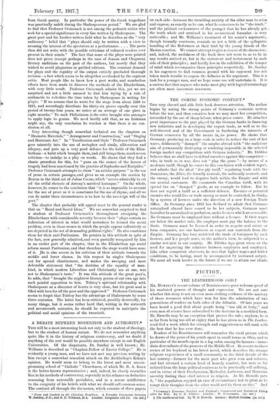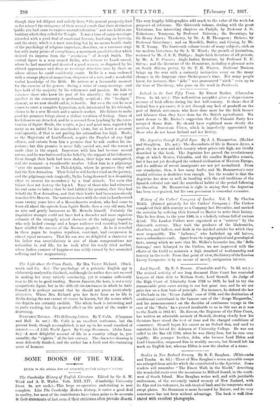FICTION.
THE LEATHERWOOD GOD.-f Ma. HOWELLS'S recent volume of Reminiscences gave welcome proof of his unabated powers of thought and expression. We are not sure whether this story is not an even more striking evidence of the mastery of those resources which have won for him the admiration of two generations of readers on both sides of the Atlantic. Of late years we have heard a good deal about people being " too old at forty," and even men of science have subscribed to the doctrine in a modified form. Mr. Howells may be an exception that proves the rule; anyhow, he is so far from being too old at eighty that ho has given us in The leather- wood God a work which for strength and suggestiveness will rank with the best that he has ever done.
Readers of his Reminiscences will remember the vivid picture which he draws of the years of his youth spent in small towns in Ohio, and in particular of the months spent in a log cabin among the farmers—irnmc- diate descendants of the pioneers of the Middle West. He reverts to these scenes of his boyhood in his latest novel, which describes tho strange religious experiences of a small community in the third decade of the last century—farmers for the most part who grew corn and tobacco, and had attained a certain level of homely comfort, but were so far isolated from the large political centres as to be practically self-sufficing, and in virtue of their Presbyterian, Methodist, Lutheran, and Moravian ancestry finding their chief interest in religion. As Mr. Howells puts it, "the population enjoyed an ease of circumstance not so great as to tempt their thoughts from the other world and fix them on this." And
• • Germany's Economic Position and England'a Commercial and Itaduidrial Policy
after the War. By G. B. Dibblee. London: W. Heinemann. [la. neta • t The Leatherwood God. By W. D. Howells. London : Herbert Jeaktas. though they led diligent and orderly lives, 4‘ the general prosperity had so far relaxed the stringency of their several creeds that their distinctive 'public rite had come to express mutual toleration " and was held in one building which they called the Temple. It was a time of camp-meetings' attended with a good deal of emotional fervour, bordering on hysteria, and the story, which is a most searching but by no means hostile study of the psychology of religious imposture, describes, on a narrower stage but with many points of resemblance, a movement parallel to that which derived its impetus from the " revelation " of Joseph Smith. The central figure is a man named Dylks, who returns to Leatherwood, where he had married and deserted a good woman, so disguised by his altered appearance and dress as to escape detection save by those on whose silence he could confidently count. Dylks is a man endowed with a strange physical magnetism, eloquence of a sort, and a wonderful verbal knowledge of the Bible. He arrives at a favourable moment for the exercise of his powers--during a series of camp-meetings -and lays hold of the majority by his vehemence and passion. He fails-to convince those who knew his past of his sincerity ; the one man of intellect in the community is profoundly sceptical ; the "hooligan'' clement, as we now should call it, is hostile. But over the rest he soon comes to exert a complete hypnotism, and, intoxicated by his triumph, (-kites to be a new Messiah and a miracle-worker. His failure to make good his promises brings about a violent revulsion of feeling. Some of his followers arc detached, and lie is rescued from lynching by the inter- vention of Squire Braile, the sceptic, a just and good man, regarded by many as an infidel for his unorthodox views, but at heart a reverent semi-agnostic, if that is not putting his rationalism too high. Braila, as the Magistrate of Leath4wood, acquits the Prophet of any legal offence, and extorts from him a promise that he will confess his im- posture; but this promise is never fully carried out, and the reason is made clear in the sequel. Imposture with him had become second nature, and he was buttressed in his belief by the support of his followers. Even though their faith had been shaken, their hope was unimpaired, and the remnant—a considerable number—follow him in a pilgrimage " 'sicr the mountains " to Philadelphia, where he promises they will find the New Jerusalem. Their belief is still further tried on the journey, and the pilgrimage ends tragically, Dylks being drowned in a despairing effort to recover his ascendancy by a final miracle. Yet even this failure does not destroy the legend. Many of those who had witnessed his end came to believe that he had fulfilled his promise, that they had beheld the New Jerusalem, and that their leader had been miraculously translated to Heaven. The narrative closes with the visit to Leatherwood some twenty years later of a Massachusetts student, who had cone to learn all about the episode from Squire Braile, then a very old man, but as wise and gently humorous as Mr. Howells himself. Certainly the inquisitive stranger could not have bad a shrewder and more sagacious estimate of the strangely mixed character of the unhappy impostor, who only lacked courage and a larger audience and sounding-board to have rivalled the success of the Mormon prophet. As he is revealed in these pages he inspires repulsion, contempt, and compassion in almost equal measures. That his son was as delightful a character as his father was unsatisfactory is one of those compensations not unfamiliar in real life, for lie took after his sorely tried mother, whose Indian summer of happiness was richly earned by her unmerited suffering and her magnanimity.



































 Previous page
Previous page